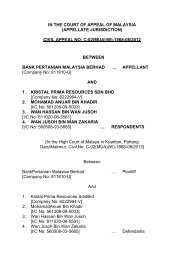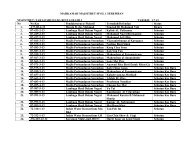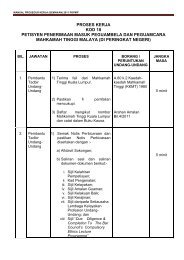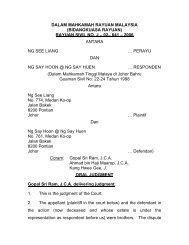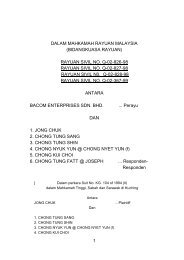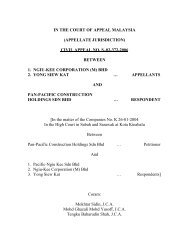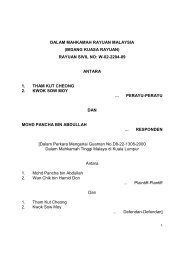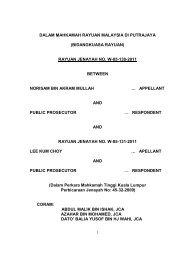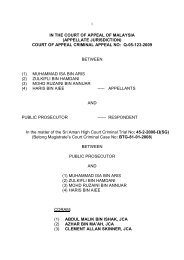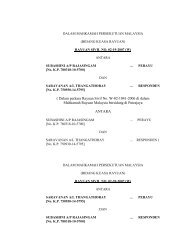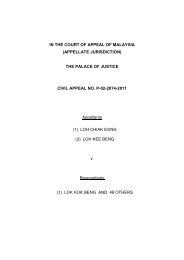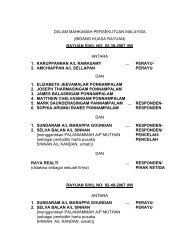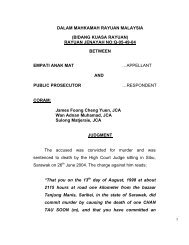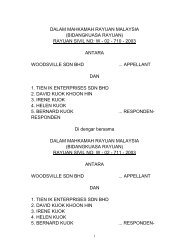bidang kuasa rayuan - Laman Web Rasmi Pejabat Ketua Pendaftar ...
bidang kuasa rayuan - Laman Web Rasmi Pejabat Ketua Pendaftar ...
bidang kuasa rayuan - Laman Web Rasmi Pejabat Ketua Pendaftar ...
Create successful ePaper yourself
Turn your PDF publications into a flip-book with our unique Google optimized e-Paper software.
5<br />
10<br />
15<br />
20<br />
25<br />
30<br />
35<br />
40<br />
45<br />
DALAM MAHKAMAH RAYUAN DI MALAYSIA<br />
(BIDANG KUASA RAYUAN)<br />
RAYUAN SIVIL NO: T-01-77-08<br />
ANTARA<br />
NORTH EAST PLANTATIONS SDN BHD … PERAYU/PEMOHON<br />
DAN<br />
1. PENTADBIR TANAH DAERAH DUNGUN ... RESPONDEN-RESPONDEN<br />
2. PENGARAH TANAH DAN GALIAN TERENGGANU<br />
(Dalam perkara Mahkamah Tinggi di Kuala Terengganu)<br />
Dalam Negeri Terengganu Darul Iman, Malaysia<br />
Semakan Kehakiman No: 13-02-2004<br />
Antara<br />
North East Plantations Sdn Bhd … Pemohon<br />
Dan<br />
1. Pentadbir Tanah Daerah Dungun ... Responden-Responden<br />
2. Pengarah Tanah Dan Galian Terengganu
5<br />
10<br />
15<br />
20<br />
25<br />
30<br />
Coram:<br />
A. Samah Nordin, J.C.A<br />
Mohd. Hishamudin Yunus, J.C.A<br />
Azhar @ Izhar b. Haji Ma‟ah, J.C.A<br />
Judgment of A. Samah Nordin, J.C.A<br />
[1] The issue in this appeal concerns the power of the<br />
State Authority to revoke its earlier approval of alienation of<br />
state land under the National Land Code (“the Code”). It is<br />
the appellant‟s contention that the State Authority has no<br />
power to revoke its earlier approval of alienation of state<br />
land under the Code. So, when the State Authority revoked<br />
its earlier approval of alienation of state land to the<br />
appellant it had in law exceeded its powers under the Code,<br />
acted in bad faith and disregarded of the rules of natural<br />
justice and the appellant‟s legitimate expectation.<br />
[2] But before examining the powers of the State Authority<br />
in respect of revocation of alienation of state land under<br />
the Code, it is necessary to put the facts in proper<br />
perspective. The State Authority of Terengganu is not itself<br />
a party to this proceeding. The second respondent is the<br />
proper party to this proceeding by virtue of section 16(2) of<br />
the Code. The first respondent, namely the Land<br />
Administrator of the District of Dungun, is made a party as<br />
2
5<br />
10<br />
15<br />
20<br />
25<br />
the land, which is the subject matter of the dispute, is<br />
situated in the District of Dungun, Terengganu.<br />
The facts<br />
[3] On 26.4.2000 the appellant applied to the then Chief<br />
Minister of Terengganu for alienation of 10,000 acres of<br />
reserved forest land in the Mukim of Besul and Mukim of<br />
Hulu Paka, in the District of Dungun for the purpose of<br />
cultivation of oil palm and cattle rearing.<br />
[4] By a letter dated 27.11.2000, the Deputy State<br />
Secretary informed the appellant that the state government<br />
had agreed to approve its application in principle subject<br />
to terms and conditions of alienation which may be imposed<br />
by the second respondent and to the revocation of forest<br />
reserved land by the Director of State Forestry. The<br />
appellant was accordingly advised to liaise with the<br />
Department of Lands and Mines and the Department of<br />
Forestry, of Terengganu.<br />
[5] This was followed by a letter dated 11.12.2000 from<br />
one Mohd Yasim bin Awang, acting on behalf of the second<br />
respondent, informing the appellant that the State<br />
Authority had approved its application in principle and<br />
3
5<br />
10<br />
15<br />
20<br />
25<br />
30<br />
35<br />
40<br />
45<br />
advised the appellant to put in a formal application to<br />
Pentadbir Tanah Daerah Dungun. The letter reads:<br />
Pengerusi Eksekutif<br />
North East Plantations Sdn Bhd<br />
No. 5, Jalan 65C, Off Jalan Pahang Barat<br />
Pekeliling Business Centre<br />
53000 Kuala Lumpur.<br />
Tuan,<br />
PERMOHONAN TANAH KERAJAAN UNTUK<br />
PEMBANGUNAN LADANG KELAPA SAWIT DAN<br />
TERNAKAN LEMBU DI NEGERI TERENGGANU<br />
SELUAS 10,000 EKAR DI KAWASAN HUTAN<br />
SIMPAN SUNGAI PAKA, MUKIM BESOL DAN<br />
HULU PAKA, DUNGUN____________________<br />
4<br />
11 December 2000<br />
Dengan hormatnya saya diarah merujuk perkara di atas, sukacita<br />
memaklumkan permohonan tuan pada dasarnya telah diluluskan oleh<br />
Pihak Ber<strong>kuasa</strong> Negeri.<br />
2. Sehubungan dengan itu tuan hendaklah merujuk kelulusan dasar<br />
ini dan mengangkat permohonan rasmi kepada Pentadbir Tanah<br />
Dungun untuk tindakannya. <strong>Pejabat</strong> ini akan mengambil tindakan<br />
lanjut selepas permohonan yang telah disempurnakan diperolehi<br />
daripada Pentadbir Tanah berkenaan.<br />
Sekian, terima kasih.<br />
“BERKHIDMAT UNTUK NEGARA”<br />
Saya yang menurut perintah,<br />
t.t<br />
(MOHD YASIM BIN AWANG)<br />
b.p Pengarah Tanah Dan Galian<br />
Terengganu.
5<br />
10<br />
15<br />
20<br />
25<br />
[6] The application for alienation of the said lands was<br />
subsequently approved by the first respondent. By State<br />
Gazette No. 67 dated 14.2.2002, the State Authority also<br />
revoked the said forest reserved land with retrospective<br />
effect from 15.11.2000.<br />
[7] On 21.5.2003, part of the land approved for alienation,<br />
consisting of three lots were issued with qualified titles,<br />
namely, HSD 840 (PT3733), HSD 841C (PT3736) and HSD<br />
842C (PT3737) and registered in the appellant‟s name.<br />
They are therefore not the subject matter of dispute<br />
between the parties herein.<br />
[8] The dispute is in respect of eight other lots (“the said<br />
lots”), consisting of 5 lots in the Mukim of Besul and 3 lots in<br />
the Mukim of Hulu Paka, with a total area of 1,627.659<br />
hectares where documents of titles had not been issued to<br />
the appellant. These 8 lots are identified as PT1548,<br />
PT1549, PT1551, PT1558, PT1559, PT3764, PT3765 and<br />
PT3767. The first respondent had however on 12.1.2004<br />
issued to the appellant 8 notices in Form 5A to pay land<br />
revenue totalling RM2,052,465.30. These notices were<br />
issued under section 81(2) of the Code. The said Form 5A<br />
notices were not exhibited in the Appeal Record but they<br />
5
5<br />
10<br />
15<br />
20<br />
25<br />
30<br />
35<br />
40<br />
45<br />
were not in dispute. The covering letter to the appellant<br />
dated 11.1.2004 enclosing the said Form 5A notices reads:<br />
DENGAN TANGAN<br />
Pengurus<br />
North East Plantations Sdn. Bhd<br />
No. 66/23, Tingkat Dua Taman Seri Intan<br />
Jalan Sultan Omar<br />
20300 KUALA TERENGGANU<br />
Tuan,<br />
PERMOHONAN PINDAAN PELAN KELULUSAN MAJLIS<br />
MESYUARAT KERAJAAN NEGERI TERENGGANU BIL 203B/2002<br />
BERTARIKH 30 JANUARI 2002 BAGI PT. 1541 MUKIM BESOL DAN<br />
PT. 3732 MUKIM HULU PAKA DI KAWASAN BANDAR AL MUKTAFI<br />
BILLAH SHAH, DAERAH DUNGUN___________________________<br />
Dengan hormatnya saya diarah merujuk kepada perkara di atas.<br />
2. Sukacita dimaklumkan bahawa Majlis Mesyuarat Kerajaan Negeri<br />
telah menimbangkan Kertas Mesyuarat Bil. 1586E/2003 bertarikh 10<br />
Disember, 2003 dan bersetuju meluluskan permohonan pindaan pelan<br />
kelulusan MMKN.TR. Bil. 203B/2002 bertarikh 30 Januari 2002 dan<br />
tuan adalah dikehendaki mengisi semula borang Jadual 1 yang<br />
dikembarkan bersama-sama ini dan kembalikan borang tersebut ke<br />
<strong>Pejabat</strong> ini bersekali dengan wang bayaran daftar sebanyak RM10.00<br />
satu lot (13 lot).<br />
3. Bersama-sama ini dikembarkan Borang 5A bagi lot-lot yang<br />
telah diberi pembebasan hutan oleh <strong>Pejabat</strong> Hutan iaitu:<br />
MUKIM BESUL:-<br />
(i) PT. 1548 - 134.90 ha ]<br />
(ii) PT. 1549 - 169.50 ha ]<br />
(iii) PT. 1551 - 421.73 ha ]<br />
(iv) PT. 1558 - 179.45 ha ]<br />
(v) PT. 1559 - 181.10 ha ]<br />
1,086.78 ha ]<br />
=======<br />
6
5<br />
10<br />
15<br />
20<br />
25<br />
30<br />
35<br />
40<br />
45<br />
MUKIM HULU PAKA:-<br />
(i) PT. 3764 - 134.17 ha ]<br />
(ii) PT. 3765 - 70.969 ha ]<br />
(iii) PT. 3767 - 335.74 ha ]<br />
-----------------<br />
540.879 ha ]<br />
=========<br />
7<br />
] 1.627.659 ha<br />
Dengan dikenakan bayaran serta syarat-syarat seperti di dalam Jadual<br />
5A berkembar dan syarat tambahan sebagaimana berikut:<br />
(i) Kawasan yang diluluskan itu hendaklah dipagar supaya<br />
tidak berkeliaran ternakan ke tanah-tanah luar kawasan<br />
dan dijagai kawasan tersebut dengan baik.<br />
(ii) Pemohon hendaklah mematuhi arahan-arahan nasihatnasihat<br />
dan syarat-syarat yang dikenakan oleh Pentadbir<br />
Tanah, Penguasa-Penguasa Tempatan, Jabatan Alam<br />
Sekitar dan Jabatan-Jabatan/Agensi-Agensi lain pada<br />
setiap masa.<br />
(iii) Sekiranya terdapat rintahan haram di kawasan tanah yang<br />
diluluskan kepada NEP, Pentadbir Tanah Dungun<br />
hendaklah berunding dan mencari penyelesaian sebaik-<br />
baiknya bagi faedah kedua-dua pihak terlibat iaitu NEP dan<br />
peneroka tanah haram. Pihak NEP dikehendaki<br />
memaklumkan kepada Pentadbir Tanah Dungun jika<br />
sekiranya ada.<br />
4. Perlu diingatkan, pembayaran ini hendaklah dijelaskan dalam<br />
masa tiga (3) bulan daripada tarikh penerimaan surat ini. Sekiranya<br />
gagal menjelaskan di dalam tempoh tersebut, maka permohonan tuan<br />
akan disifatkan sebagai telah ditarik balik dan kelulusan yang telah<br />
diberikan itu akan luput dengan sendirinya. Bayaran tersebut<br />
hendaklah dibuat dalam dua (2) keping cek:-<br />
(i) Hasil Negeri - RM2,052,385.30<br />
(ii) Hasil Persekutuan- RM 80.00<br />
RM2,052,465.30<br />
===========
5<br />
10<br />
15<br />
20<br />
25<br />
30<br />
35<br />
5. Tuan juga hendaklah mengemukakan Sijil Akuan Lembaga<br />
Jurukur Tanah semasa membuat pembayaran tersebut.<br />
Sekian, terima kasih.<br />
“Membangun Menurut Islam”<br />
Saya yang menurut perintah,<br />
t.t<br />
(IBRAHIM BIN MOHAMAD)<br />
<strong>Ketua</strong> Penolong Pentadbir Tanah<br />
b.p Pentadbir Tanah<br />
Dungun<br />
[9] The said sum of RM2,052,465.30 was for payment of<br />
quit rent, land premiums, survey fees and preparation and<br />
registration of land titles (“the land revenue”). The<br />
appellant was required to pay the said sum within three<br />
months from the receipt of the abovesaid letter.<br />
[10] On 4.3.2004 the State Assembly of the State of<br />
Terengganu was dissolved to pave the way for the general<br />
election, which was held on 21.3.2004. It was during this<br />
transitional period that the second respondent issued a<br />
letter dated 23.3.2004 to all the District Land<br />
Administrators in the State of Terengganu, to freeze<br />
temporarily all matters relating to land administration in the<br />
state until further notice, including, among others, the<br />
registration of qualified titles and notices/offers to land<br />
8
5<br />
10<br />
15<br />
20<br />
25<br />
30<br />
35<br />
40<br />
applicants whose applications had been approved by the<br />
State Authority. The material part of the letter reads:<br />
Pelaksanaan Dasar Tanah Negeri<br />
Dengan hormatnya saya merujuk perkara di atas.<br />
2. Sebagaimana dimaklumkan bahawa Pentadbiran Negeri<br />
telah bertukar mulai 22 Mac 2004. Selaras dengan itu urusan<br />
Pentadbiran Tanah Negeri yang berkaitan dengan yang<br />
dinyatakan di bawah hendaklah ditawakof buat sementara<br />
sehingga diberitahu kemudian:-<br />
2.1 ............<br />
2.2 <strong>Pendaftar</strong>an<br />
pertama).<br />
Hakmilik Sementara (Hakmilik<br />
2.3 ...........<br />
2.4 ...........<br />
2.5 Pengeluaran Lesen Menduduki Sementara.<br />
3. Arahan ini berkuat<strong>kuasa</strong> serta merta pada tarikh surat ini<br />
dikeluarkan.<br />
Sekian, terima kasih.<br />
“BERKHIDMAT UNTUK NEGARA”<br />
Saya yang menurut perintah,<br />
t.t<br />
(HAJI HASHIM BIN MAMAT)<br />
Pengarah Tanah dan Galian<br />
Terengganu<br />
9
5<br />
10<br />
15<br />
20<br />
25<br />
30<br />
[11] The previous State Government under the rule of PAS<br />
lost to Barisan National in the general election. The new<br />
State Executive Council under the succeeding government<br />
was only sworn in and appointed by His Highness the Sultan<br />
of Terengganu on 25.3.2004. It held its first meeting on<br />
7.4.2004.<br />
[12] It was also during the transitional period, that the<br />
appellant by a letter dated 22.3.2004 paid the said sum by<br />
way of two bankers cheques, namely –<br />
(1) MBB263354 in the sum of RM2,052,885.30, and<br />
(2) MBB263353 in the sum of RM80.50<br />
[13] The first respondent however refused to accept the<br />
said payment and returned the cheques. The appellant then<br />
reforwarded the same cheques to the first respondent<br />
through its solicitors by a letter dated 24.3.2004. The first<br />
respondent, by a letter dated 15.4.2004 rejected the<br />
payment and returned the said cheques to the appellant on<br />
the ground that the State Executive Council had at its<br />
meeting on 7.4.2004 revoked the previous approval of<br />
alienation of the said lots. This letter reads:<br />
10
5<br />
10<br />
15<br />
20<br />
25<br />
30<br />
35<br />
40<br />
45<br />
DENGAN TANGAN<br />
Pengurus<br />
North East Plantations Sdn. Bhd,<br />
d/a: Tetuan Fariz Halim & Co,<br />
No. 20 Mezzanine Floor,<br />
Taman Sri Intan,<br />
Jalan Sultan Omar,<br />
20300 KUALA TERENGGANU.<br />
Tuan,<br />
Surat Kita : PTD/03/15/2001/0001-(28)<br />
Bertarikh : 15 April 2004<br />
Bersamaan : 25 Safar 1425<br />
Dengan hormatnya saya diarah merujuk kepada surat tuan<br />
FHC/mka/001/04 bertarikh 24 Mac, 2004 mengenai perkara di atas.<br />
2. Dimaklumkan Majlis Mesyuarat Kerajaan Negeri yang bersidang<br />
pada 07 April, 2004 telah bersetuju MENOLAK bayaran yang telah<br />
dikemukakan dan membatalkan pemberian tanah yang telah<br />
diluluskan di kawasan Mukim Besul dan Hulu Paka kepada pihak tuan.<br />
3. Bersama-sama ini dikembalikan Cek MBB No. 263353 bertarikh<br />
22 Mac, 2004 berjumlah RM80.50 dan Cek MBB No. 263354 bertarikh<br />
22 Mac, 2004 berjumlah RM2,052,885.20.<br />
Sekian, terima kasih.<br />
“Islam Hadhari Terengganu Bestari”<br />
“Berkhidmat Untuk Negara”<br />
Saya yang menurut perintah,<br />
t.t<br />
(IBRAHIM BIN MOHAMAD)<br />
<strong>Ketua</strong> Penolong Pentadbir Tanah<br />
b.p Pentadbir Tanah<br />
Dungun.<br />
11
5<br />
10<br />
15<br />
20<br />
25<br />
30<br />
[14] Being apparently dissatisfied by the abrupt change of<br />
policy of the State Authority under the new State<br />
Government, the appellant, after having obtained leave of<br />
the Court, filed an application for a judicial review under<br />
Order 53 of the Rules of the High Court 1980 seeking the<br />
following declarations:<br />
(a) That the decision of the State Executive Council on<br />
7.4.2004 in rejecting the appellant‟s payment of<br />
RM80.50 and RM2,052,885.30 for land revenue<br />
and revoking the alienation of the land which had<br />
been previously approved was null and void, ultra<br />
vires and of no legal effect;<br />
(b) That the appellant is entitled to and be registered<br />
as the lawful proprietor of the said 8 lots;<br />
(c) Further or alternatively, an order of certiorari be<br />
issued by the court revoking the said decision;<br />
(d) Further or alternatively an order of mandamus be<br />
issued to compel the respondents to accept the<br />
said payment and to take all the necessary steps<br />
to register the said 8 lots in the name of the<br />
appellant;<br />
12
5<br />
10<br />
15<br />
20<br />
25<br />
(e) Damages;<br />
(f) Exemplary damages;<br />
(g) Punitive damages; and<br />
(h) Costs<br />
[15] The learned trial judge dismissed the appellant‟s<br />
application for judicial review with costs. He was of the view<br />
that by virtue of section 78(3) of the Code, the said lots<br />
remained as state land until the registration of document of<br />
title in the appellant‟s name notwithstanding the said<br />
alienation. Until then, the State Authority had absolute right<br />
to take whatever action in relation to the said land as it<br />
deems appropriate. He disagreed with the appellant‟s<br />
contention that the document of titles should be issued<br />
as a matter of course pursuant to section 80(3) and 81(1)<br />
of the Code once notices to pay land revenue in Form 5A<br />
had been issued and payment made by the appellant. He<br />
held that although payment was made, it was rejected by<br />
the State Authority. He found that there was no evidence of<br />
male fide as alleged. It was a mere perception on the part<br />
of the appellant.<br />
13
5<br />
10<br />
15<br />
20<br />
25<br />
[16] With regard to legitimate expectation, the learned<br />
judge held that the appellant had no legitimate expectation<br />
that titles would be issued in due course like the other three<br />
qualified titles issued earlier, in view of section 78(3) of the<br />
Code that the said lots remained as state land until<br />
registration.<br />
[17] The appellant‟s appeal before us is against the<br />
dismissal of its application for judicial review by the learned<br />
judge.<br />
Alienation of state land<br />
[18] The appellant‟s main contention is that the State<br />
Authority has no power under the Code to revoke or<br />
withdraw the approval of the alienation of state land which<br />
had been approved earlier. Such power is not provided for<br />
under the Code. This contention is further fortified by the<br />
fact that the first respondent had, pursuant to section 81(2)<br />
of the Code issued notices in Form 5A to the appellant to<br />
pay the land revenue due, which payment had in fact been<br />
made. As such by reason of section 80(3) of the Code, the<br />
respondents, to be precise the first respondent, is<br />
statutorily bound to issue the qualified titles. It was<br />
submitted that the word “shall” in section 80(3) of the Code<br />
14
5<br />
10<br />
15<br />
20<br />
25<br />
30<br />
35<br />
is mandatory in nature. The respondent had no choice but<br />
to issue the qualified titles.<br />
[19] For convenience, sections 78(3), 80(3) and 81(2) of<br />
the Code are reproduced below.<br />
78(3) “The alienation of State land shall take effect upon the<br />
registration of a register document of title thereto<br />
pursuant to the provisions referred to in subsection (1)<br />
or (2), as the case may be; and, notwithstanding that<br />
its alienation has been approved by the State Authority,<br />
the land shall remain State land until that time”.<br />
80(3) “Subject to subsection (2) of section 81, upon the<br />
approval of the alienation of any land by the State<br />
Authority under this Act and upon payment of all fees<br />
the Registrar shall prepare, register and issue a<br />
qualified title in respect of the land”.<br />
81(2) “As soon as may be after any sums have become due in<br />
respect of any land by virtue of subsection (1), the Land<br />
Administrator shall, by notice in Form 5A, require the<br />
intended proprietor to pay them to him within the time<br />
specified in that behalf in the notice, and if any such<br />
sum is not so paid within the specified time, the<br />
approval of the State Authority to the alienation shall<br />
thereupon lapse”.<br />
[20] The word „alienate‟ is defined in section 5 of the Code:<br />
“alienate” means to dispose of State land in perpetuity or for<br />
term of years, in consideration of the payment of rent, and<br />
otherwise in accordance with the provisions of section 76 or,<br />
when used in relation to the period before the commencement of<br />
this Act, to dispose of State land in perpetuity or for a term of<br />
15
5<br />
10<br />
15<br />
20<br />
25<br />
30<br />
35<br />
years under a previous land law (not being a law relating to<br />
mining)”<br />
When does alienation take effect under section 76 of the<br />
Code? Hashim Yeop A. Sani J (as he then was) in Dr. Ti<br />
Teow Siew & Ors v <strong>Pendaftar</strong> Geran-Geran Tanah,<br />
Selangor [1982] 1 MLJ 38 at page 39 said:<br />
“Section 78(3) of the Code determines when an alienation of<br />
State land take effect and it is clear from that subsection that<br />
alienation takes effect upon registration”<br />
[21] Abdoolcader F.J in Government of Negeri Sembilan<br />
& Anor v Yap Chong Lan & 12 Ors, Lesco Development<br />
Corporation Sdn Bhd v Yap Chong Lan & 12 Ors<br />
(“Lesco case”) [1984) 2 MLJ 123 at page 128 held the<br />
same view:<br />
“..... section 78(3) provides that the alienation of State land<br />
shall take effect upon the registration of a register document of<br />
title thereto pursuant to the provisions referred to in subsection<br />
(1) or (2), and notwithstanding that its alienation has been<br />
approved by the State Authority, the land shall remain state land<br />
until that time”.<br />
[22] In Rahmah bt Ali & Ismail bin Awang v<br />
Government of Pahang (High Court (Kuantan) Civil Suits<br />
No 436 and 456 of 1977) Razak J, dismissed the plaintiff‟s<br />
contention that the defendant could not revoke the approval<br />
of alienation after payment of premium and other fees had<br />
16
5<br />
10<br />
15<br />
20<br />
25<br />
30<br />
been made. The defendant nevertheless withdrew its earlier<br />
approval and refunded the payment. Razak J said:<br />
“It is a fact that although the land had been approved for<br />
alienation, it had never been registered. The land, in other<br />
words, is still State land and the plaintiff‟s have no title to it.<br />
The defendant could therefore repossess it at any time they so<br />
choose”.<br />
The appellant however sought to distinguish the abovesaid<br />
case on the ground that section 80 of the Code at that time<br />
was different from the current section 80(3) of the Code and<br />
that the issue of legitimate expectation was not canvassed<br />
in that case.<br />
[23] In our judgment, all the abovesaid cases reaffirmed<br />
what the legislature had, in clear words, enacted that the<br />
lands remain as State land unless and until registration, or<br />
as in this case, until they are registered in the appellant‟s<br />
name. There is no doubt that the process of alienation had<br />
not been completed. The document of titles had not been<br />
issued to the appellant. Being state land, it is, by virtue of<br />
section 40(a) of the Code still vested solely in the State<br />
Authority. Section 48 of the Code makes it clear that no<br />
title to State land shall be acquired by possession, unlawful<br />
occupation or occupation under any licence for any period<br />
whatsoever. It is immaterial whether the appellant had<br />
17
5<br />
10<br />
15<br />
20<br />
25<br />
prematurely entered into possession of the land and claimed<br />
to have planted some 693.408 hectares of the land originally<br />
approved in principle for alienation with oil palm. The<br />
respondents had no authority to bind the State Authority<br />
even if permission to enter into possession, as alleged in the<br />
appellant‟s submission, had been granted by the<br />
respondents: see Lesco case, supra, Sidek bin Haji<br />
Muhamad & 461 Ors v The Government of the State of<br />
Perak & Ors [1982] 1 MLJ 313, 314. The affidavit evidence<br />
shows that there was no written approval to support that<br />
contention.<br />
Notices in Form 5A<br />
[24] It is further contended that the State Authority is duty<br />
bound under the Code to issue the qualified titles after<br />
payment of land revenue was made to the first respondent.<br />
The contention is based on section 80(3) of the Code which<br />
states that, “upon payment of all fees the Registrar shall<br />
prepare, register and issue a qualified title in respect of the<br />
land”. The word “shall” in that subsection, it was<br />
submitted, makes it mandatory for the Registrar to issue the<br />
qualified title upon payment being made by the appellant<br />
pursuant to Form 5A notices, within the specified time. As<br />
18
5<br />
10<br />
15<br />
20<br />
25<br />
such the State Authority had no power to revoke the<br />
approval for alienation.<br />
[25] Upon a close scrutiny of the Code, it appears that there<br />
is no express provision therein which prohibits the State<br />
Authority to revoke or withdraw prior approval of alienation<br />
of State land before the registration of a register document<br />
of title. The wording of section 78(3) of the Code tends to<br />
suggest that such provision is not necessary. The need to<br />
revoke has not arisen as the land is still state land by virtue<br />
of the said section. The contention that the State<br />
Authority cannot revoke the approval for alienation of state<br />
land once approved goes against the grain of section 78(3)<br />
itself. The power to revoke is implicit in that subsection<br />
itself. It is absurd to say that the State Authority has lost<br />
control over the land after alienation when section 78(3)<br />
plainly states that it is still its land until registration.<br />
[26] Section 80(3) of the Code cannot be read in isolation.<br />
It must be viewed against the whole scheme of the Code.<br />
The purpose of section 80(3), which was introduced in 1984<br />
by the National Land Code (Amendment) Act 1984 (Act<br />
A587) was to cut down unnecessary delay in the issuance of<br />
qualified titles once payment of the land revenue as<br />
specified in Form 5A had been made. Section 80(3)<br />
19
5<br />
10<br />
15<br />
20<br />
25<br />
however does not impose a deadline for registration. Prior<br />
to that there was no such requirement. The amendment<br />
was not intended to take away or curtail the power of the<br />
State Authority in dealing with its land as it is, in law, still<br />
state land until registration of title in the name of the<br />
appellant. It may, prior to registration decide to change or<br />
reverse its decision so long as it is done in the interest<br />
of the state or the public and made in good faith. Section<br />
80(3) which only came into force in 1984 was never<br />
intended to supercede section 78(3) of the Code.<br />
[27] It is apparent that even on the facts of the case<br />
alone, the appellant could not succeed. The sole authority<br />
on State land is the State Authority: see section 40 of the<br />
Code. The first respondent had to return the payment to<br />
the appellant as the State Authority refused to accept it and<br />
had decided to revoke the approval of alienation of the said<br />
land. Under the circumstances the first respondent could<br />
not therefore proceed with the issue of qualified title under<br />
section 80(3) of the Code. The first respondent‟s refusal to<br />
accept payment after keeping the cheques for about two<br />
weeks prior to the decision of the State Authority on<br />
7.4.2004 was understandable. The payment was made<br />
during the transitional period before the new State<br />
government was sworn in. This was not a case where the<br />
20
5<br />
10<br />
15<br />
20<br />
25<br />
previous state government before the dissolution of the<br />
State Assembly had been returned to power with a fresh<br />
mandate after the election. It was a complete change of<br />
government from the previous government under the rule of<br />
PAS to a new government under the Barisan National. The<br />
respondents being mere government servants, may want<br />
to wait for further instructions. It was due to the change in<br />
the government that prompted Haji Hashim bin Mamat, to<br />
issue the instructions dated 23.3.2004 to all District Land<br />
Administrators to freeze temporarily certain matters<br />
pertaining to administration of land in the state.<br />
[28] One cannot impute bad faith purely on mere refusal to<br />
accept payment. The directive issued by the State Director<br />
of Lands and Mines was purely administrative in nature. It<br />
was done out of prudence to preserve the status quo<br />
during the transitional period or „vacuum‟ pending the<br />
formation of the new state government. Section 12(3)(a) of<br />
the Code states that the State Director of Lands and Mines is<br />
responsible to the State Authority for the due administration<br />
within the state of the provisions of the Code. Under section<br />
12(3)(d), the State Director of Lands and Mines is<br />
empowered to exercise general control and supervision of<br />
his officers. It cannot be said that it was done in bad faith<br />
when what he did was within his power. The definition of<br />
21
5<br />
10<br />
15<br />
20<br />
25<br />
„State Director‟ in section 5 of the Code includes a Deputy<br />
Director of Lands and Mines.<br />
[29] Pengarah Tanah dan Galian, Wilayah Persekutuan<br />
v Sri Lempah Enterprise Sdn Bhd [1979] 1 MLJ 135 is<br />
clearly distinguishable. The subject matter was not state<br />
land. It was in respect of alienated land where title in<br />
perpetuity had already been issued and registered in the<br />
respondent‟s name. The issue in that case was whether the<br />
Land Executive Committee of the Federal Territory had the<br />
right to impose a condition pursuant to the respondent‟s<br />
application for conversion and subdivision, that the<br />
respondent would get back his titles, not in perpetuity but a<br />
lease of 99 years. The respondent, being dissatisfied,<br />
appealed to the High Court under section 418 of the Code.<br />
Harun J allowed the appeal. The appellant appealed to the<br />
Federal Court. The Federal Court dismissed the appeal<br />
holding that the appellant had no power to make the<br />
respondent give up its freehold title and receive in exchange<br />
a 99 year lease.<br />
[30] The burden of proof to establish bad faith is on the<br />
appellant: see section 101 Evidence Act 1950, Yeap Seok<br />
Pen v Government of the State of Kelantan [1986] 1<br />
MLJ 449. Upon perusal of the appellant‟s affidavits, we find<br />
22
5<br />
10<br />
15<br />
20<br />
25<br />
that there is no evidence to support such allegation. It is<br />
based on suspicion or conjecture. The Code does not<br />
require the State Authority to give reasons for the said<br />
revocation. There is no express provision to that effect.<br />
Nevertheless, the second respondent in his affidavit-in-reply<br />
explained, among others, that the revocation was due to the<br />
need to maintain forest sustainability and this view was<br />
formed after having considered the various technical reports<br />
from the relevant departments. It must be noted that the<br />
land approved in principle for alienation was in fact a<br />
permanent forest reserve. The revocation such forest<br />
reserved land would in fact reduced the size of forest<br />
reserved land in the state, which could have adverse effect<br />
on the ecosystem and natural habitat in the state.<br />
Legitimate expectation<br />
[31] The basis of the appellant‟s contention that it had a<br />
legitimate expectation that qualified titles to the said lots<br />
would be issued is based on the facts that the State<br />
Authority had approved the alienation of the said land to it<br />
and that it had duly paid the sum due pursuant to Form 5A<br />
notices within time. Section 80(3) of the Code provides<br />
that upon payment of all fees the Registrar shall prepare,<br />
register and issue a qualified title in respect of the land. It<br />
23
5<br />
10<br />
15<br />
20<br />
25<br />
30<br />
35<br />
was submitted that „legitimate expectation‟ includes<br />
expectation which goes beyond legal right provided it has<br />
some reasonable basis: See Attorney General of Hong<br />
Kong v Ng Yuen Shiu [1983] 2 AC 629.<br />
[32] In Council of Civil Service Unions & Ors v Minister<br />
for Civil Service [1985] 1 AC 374 Lord Fraser of Tullybelton<br />
said:<br />
“But even where a person claiming some benefit or privilege has<br />
no legal right to it as a matter of private law, he may have a<br />
legitimate expectation of receiving the benefit or privilege, and,<br />
if so, the Courts will protect his expectation by judicial review as<br />
a matter of public law”.<br />
[33] Lord Diplock, in the same case at page 408 said that<br />
for a legitimate expectation to arise the decision must affect<br />
the other person either:<br />
(a) by altering rights or obligations of that person which are<br />
enforceable by or against him in private law; or<br />
(b) by depriving him of some benefit or advantage which<br />
either (i) he had in the past been permitted by the decision<br />
maker to enjoy and which he can legitimately expect to be<br />
permitted to continue to do until there has been<br />
communicated to him some rational grounds for<br />
withdrawing it on which he has been given an opportunity<br />
to comment; or (ii) he has received assurance from the<br />
decision – maker will not be withdrawn without giving him<br />
an opportunity of advancing reasons for contending that<br />
they should not be withdrawn”.<br />
24
5<br />
10<br />
15<br />
20<br />
25<br />
30<br />
[34] What the appellant is claiming here is not just a right to<br />
a fair hearing before the State Authority revoked its<br />
approval of alienation of the said land. Its complaint is not<br />
confined to procedural impropriety on the part of the State<br />
Authority. It goes beyond that. It expects to get the<br />
„substance‟ of the expectation itself, namely, the qualified<br />
titles to the said lots once it had shown that it was deprived<br />
of its legitimate expectation.<br />
[35] Decided cases however had shown that the doctrine of<br />
legitimate expectation cannot be applied indiscriminately in<br />
all cases. It does not apply to every single case of denial of<br />
a fair hearing or opportunity to make representation before<br />
a decision is made. Thus in Council of Civil Service<br />
Unions & Ors v Minister for Civil Service, supra the<br />
House of Lords held that the appellants had no legitimate<br />
expectation to prior consultation before the minister varied<br />
the terms and conditions of service of the staff to the effect<br />
that they would no longer be permitted to belong to national<br />
trade unions on the grounds of national security. Lord<br />
Diplock at page 412 said:<br />
“National security is the responsibility of the executive<br />
government ..... It is par excellence a non-justiciable question.<br />
The judicial process is totally inept to deal with the sort of<br />
problems which it involves”.<br />
25
5<br />
10<br />
15<br />
20<br />
25<br />
[36] It had not been shown to us that the denial of a right of<br />
fair hearing or the opportunity to make representation,<br />
which Lord Diplock referred to as “procedural impropriety”<br />
would entitle the appellant to the actual substance of the<br />
expectation, which in this case, is the qualified titles to the<br />
said lots. No case was cited to us in support thereof. The<br />
basis of the appellant‟s contention here is that it had a<br />
legitimate expectation to the titles of the said lots by reason<br />
of section 80(3) of the Code after having made the payment<br />
as specified in Form 5A notices, within time. In short, the<br />
appellant insisted that the respondents must perform their<br />
duty by issuing titles to the said lots.<br />
[37] In our judgment, this proposition cannot be sustained<br />
in the face of expressed provision in section 78(3) of the<br />
Code. Section 80(3) of the Code should not be considered<br />
in isolation. It must be viewed in the context of the whole<br />
scheme of the Code. The land law, which is codified in the<br />
Code is based on a system of registration. Section 40 of the<br />
Code vests the entire property of all state land in the State<br />
Authority. Section 78(3) states that alienation of state land<br />
shall only take effect upon the registration of a register<br />
document of title. The appellant does not acquire<br />
indefeasible title to the land under section 340 of the Code<br />
until it is registered in its name.<br />
26
5<br />
10<br />
15<br />
20<br />
25<br />
[38] There is ample authority that a public body cannot<br />
exercise its powers or discretion contrary to the statute. In<br />
Cudgen Rutile (No.2) Pty Ltd & Anor v Gordon William<br />
Wesley Chalk [1975] AC 520 P.C, an Australian case,<br />
referred to by the Federal Court in Lesco case, the Privy<br />
Council held that the Crown in Australia could not contract<br />
for the disposal of any interest in Crown lands except in<br />
accordance with powers conferred by a statute and<br />
accordingly, where a statute prescribed a mode of exercise<br />
of the statutory power that had to be observed.<br />
[39] In that case the appellants carried on the business of<br />
mineral sand mining in Queensland. The appellants were<br />
holders of an authority to prospect, granted under section<br />
23A of the Mining Act 1898 by the Minister of Mines in<br />
respect of an area of approximately 18 square miles, which<br />
was renewable for a further period of one year. On their<br />
application for renewal, the Minister granted the renewal to<br />
prospect on the Crown lands for all minerals other than coal,<br />
mineral oil and petroleum. When the appellants discovered<br />
large mineral deposits on the Crown lands, they applied for<br />
special mineral leases in respect of the minerals so<br />
discovered. The Mining Warden, who heard the applications<br />
recommended that the leases should be granted but the<br />
government refused to grant any.<br />
27
5<br />
10<br />
15<br />
20<br />
25<br />
30<br />
35<br />
[40] The appellants then instituted proceedings , claiming,<br />
inter alia, specific performance of the contract which they<br />
alleged existed to grant them the leases. The issue of law<br />
before the Privy Council turned on the power of the Crown to<br />
dispose Crown land, by lease. It was submitted on behalf of<br />
the Crown that it could not contract for the disposal of any<br />
interest in Crown lands unless under and in accordance with<br />
power to the effect conferred by statute. Lord Wilberforce<br />
agreed with the Crown contention and at page 533 said;<br />
“.... when a statute, regulating the disposal of Crown lands, or of<br />
an interest in them, prescribes a mode of exercise of the<br />
statutory power, that mode must be followed and observed, and<br />
if it contemplates the making of decisions , or the use of<br />
discretions, at particular stages of the statutory process, those<br />
decisions must be made, and discretions used, at the stages laid<br />
down. From this in turn it must follow that the freedom of the<br />
Minister or officer of the Crown responsible for implementing the<br />
statute to make his decisions, or use his discretions, cannot<br />
validly be fettered by anticipatory action and if the Minister or<br />
officer purports to do this, by contractually fettering himself in<br />
advance, his action in doing so exceeds his statutory powers”.<br />
[41] The Privy Council in that case approved what Rich J<br />
said in State of New South Wales v Bardolph (1934) 52<br />
CLR 455, 496. Rich J. said:<br />
“When the administration of particular functions of government<br />
is regulated by statute and the regulation expressly or impliedly<br />
touches the power of contracting, all statutory conditions must<br />
be observed and the power no doubt is no wider than the statute<br />
contemplates”.<br />
28
5<br />
10<br />
15<br />
20<br />
25<br />
[42] Similarly, in this appeal there is a statute namely, the<br />
Code which expressly prescribes a specific mode for<br />
alienation of state land, lays down the various steps to be<br />
taken before the issue of documents of titles and declares<br />
that the land shall remain state land until registration of a<br />
register document of title. The rights, duties and liabilities<br />
of the State Authority vis-a-vis that of the appellant has<br />
been exhaustively spelt out in the Code. Abdoolcader J in<br />
delivering the judgment of the Federal Court in Pemungut<br />
Hasil Tanah, Kota Tinggi v UMBC Bhd [1981] 2 MLJ 264,<br />
pointed out that, “The relevant provisions of the Code<br />
provide a complete code regulating the respective rights,<br />
duties and liabilities of the State Authority and its agents on<br />
the one hand and the registered proprietor of alienated land<br />
on the other hand in relation to the rent payable in respect<br />
thereof and no recourse can legitimately be had to look<br />
beyond their specific terms to seek any relief for the<br />
hardship”. Although that observation was made in respect<br />
of forfeiture of alienated land for non-payment of rent, the<br />
Code also represents a complete code regulating the<br />
respective rights, duties and liabilities of the State Authority<br />
in respect of state land vis-a-vis that of the appellant.<br />
[43] In our judgment, legitimate expectation cannot and<br />
should not, override the express statutory provisions of the<br />
29
5<br />
10<br />
15<br />
20<br />
25<br />
30<br />
Code. The appellant here is in a worse situation. It has no<br />
legitimate expectation that titles would be issued to it<br />
when the State Authority had validly revoked the approval of<br />
alienation of the said lots. At the time of revocation, the<br />
said lots were still state land.<br />
[44] The outcome is inevitable. For the abovesaid reasons<br />
the appeal is dismissed with costs. My learned brother<br />
Azhar @ Izhar bin Haji Ma‟ah, J.C.A. had seen this judgment<br />
in draft and expressed his agreement with it.<br />
Dated this 28 th October, 2010<br />
A.Samah Nordin<br />
Judge<br />
Court of Appeal,<br />
Putrajaya, Malaysia.<br />
Parties<br />
1. Tun Salleh Abbas and En. Abdul Haris bin Abdul Malik<br />
for the Appellant<br />
(Messrs Abdul Haris & Co).<br />
2. YB. Norbahari bin Baharuddin for the Respondents<br />
(<strong>Pejabat</strong> Penasihat Undang-Undang, Negeri Terengganu).<br />
30



